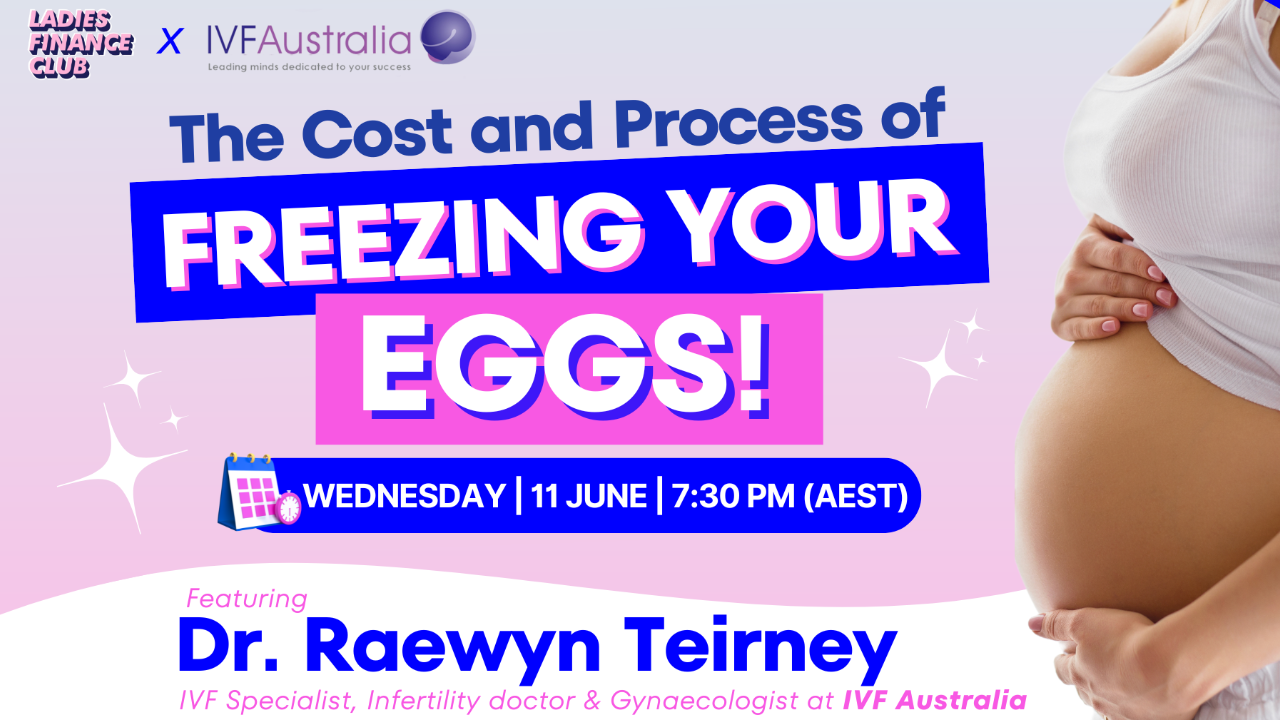What You Really Need to Know About Freezing Your Eggs
Jun 18, 2025
Featuring Dr. Raewyn Teirney | Hosted by Ladies Finance Club
Whether you’re 19 and just learning about your fertility, or 39 and considering your next steps, our recent webinar with fertility expert Dr. Raewyn Teirney from IVF Australia was packed with the info (and reassurance) we all needed. We had 288 registrations and 105 women join us live from across Australia, NSW, QLD, VIC, SA, WA, and ACT joined us live to ask the real questions and learn more about the actual cost, process, and science behind freezing your eggs.
Spoiler: There were a lot of “OMG I didn’t know that” moments.

Real Talk, Real Questions
Our community came through with over 50 thoughtful questions, ranging from practical to deeply personal. Here are some of the most-asked:
💭 “Is it okay if I don’t even know if I want kids but still want the option?”
💭 “Does PCOS qualify as a medical reason for Medicare?”
💭 “How many eggs do you actually need to freeze for a real chance at a baby?”
💭 “If I’m overweight now, should I wait until I’m healthier to freeze my eggs?”
💭 “Will egg freezing bring on early menopause?”
💭 “Does smoking (or even second-hand smoke) affect egg quality?”
💭 “Can you move your eggs interstate or overseas?”
💭 “Do clinics offer payment plans?”
The good news? Dr. Raewyn answered them all with clarity, compassion, and zero fluff.
What We Learned About Egg Freezing
- We’re born with all the eggs we’ll ever have. Think of your ovaries as warehouses, you start with ~2 million eggs at birth, and by puberty, you're down to 400,000. Each month, ~20 eggs start developing, but only one ovulates. The rest? They fade away.
- Egg quality and quantity both drop with age. That’s why many fertility experts recommend freezing before 35 (some say even earlier, like 28).
- Freezing younger eggs preserves their quality. Frozen eggs stay the age they were when retrieved, even if you come back to use them a decade later.
- It doesn’t trigger early menopause. The process uses the eggs your body had already planned to release that month.
- You can still work and live your life during the cycle. You’ll feel a bit tired and bloated, but many women continue with their day-to-day routines.
What’s Involved in the Process?
- Referral from your GP (this step is required, even if you already see a gynae!)
- Initial consultation with a fertility specialist
- Fertility tests including an AMH blood test and pelvic scan
- Two weeks of hormone injections (easy-to-use pens, similar to Ozempic)
- Egg collection procedure (30 minutes under sedation, done vaginally)
- Eggs are frozen and stored (you can even move them overseas later if needed)
One participant shared: “I thought the injections would hurt—but they didn’t at all!”
Let’s Talk Money
Without Medicare:
- Roughly $8,000 per cycle, including medication
- Annual storage fee of ~$600
With Medicare (for medical reasons like endo, PCOS, low AMH, autoimmune disorders):
- Receive a ~$3,500 rebate, cutting costs nearly in half
- Many women qualify, speak with your doctor
Note: Private health doesn’t cover egg freezing, but may cover day surgery.
How Many Eggs Do You Need?
Dr. Raewyn gave us the inside scoop based on age:
- Under 35: Freeze 10–15 eggs for ~80% chance of one live birth
- 35–40: Aim for more eggs (may need 2+ cycles)
- 40+: Still possible, but fewer eggs, more uncertainty
One attendee asked: “Can I do back-to-back cycles?”
Yes, but Dr. Raewyn recommends taking a break between for your wellbeing.
Lifestyle Factors That Impact Egg Health
Good news: Coffee’s okay (2 a day max). Bad news: Smoking and vaping? Not so much.
DO:
- Eat a Mediterranean diet
- Exercise regularly
- Get your vitamin D checked
- Limit alcohol
- Sleep well
DON’T:
- Smoke or vape
- Ignore your fertility timeline
- Stress over one AMH test result (it’s just one piece of the puzzle!)

So, if you’re thinking about freezing your eggs, the best first step is to speak with your GP and request a referral. You can also ask for an AMH blood test and a pelvic scan to better understand where your fertility stands. And if you’re curious to learn more, download the free egg freezing guide from IVF Australia.
This session was a reminder that while freezing your eggs isn’t a guaranteed baby-making plan, it is a powerful option. It’s about giving yourself choices, and peace of mind for the future.
Thank you to Dr Raewyn Teirney and IVF Australia for their support! Watch the replay here.



